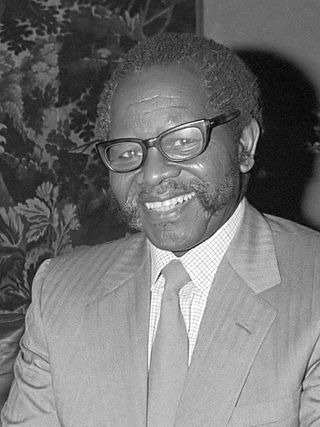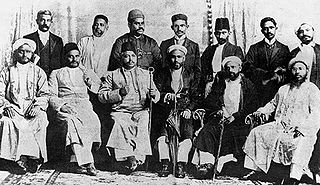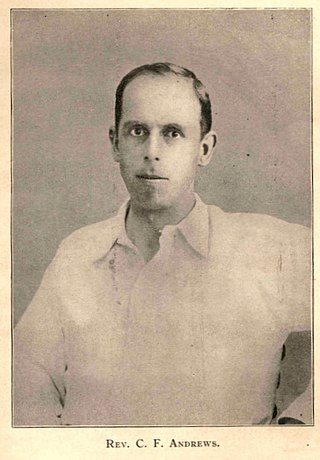
Mohandas Karamchand Gandhi was an Indian lawyer, anti-colonial nationalist and political ethicist who employed nonviolent resistance to lead the successful campaign for India's independence from British rule. He inspired movements for civil rights and freedom across the world. The honorific Mahātmā, first applied to him in South Africa in 1914, is now used throughout the world.

Oliver Reginald Kaizana Tambo was a South African anti-apartheid politician and activist who served as President of the African National Congress (ANC) from 1967 to 1991.

Fatima Meer was a South African writer, academic, screenwriter, and prominent anti-apartheid activist.
Inanda or eNanda is a township in KwaZulu-Natal, South Africa that is situated 21 km north-west of Durban. It forms part of eThekwini, the Greater Durban Metropolitan Municipality. Populated primarily by Zulu-speaking Black Africans, Inanda is the home of John Langalibalele Dube, first President of the African National Congress (ANC), a former residence and base of operations of Mahatma Gandhi, and the birthplace of the syncretic Nazareth Baptist Church

Gandhism is a body of ideas that describes the inspiration, vision, and the life work of Mohandas K. Gandhi. It is particularly associated with his contributions to the idea of nonviolent resistance, sometimes also called civil resistance.

The Bambatha Rebellion of 1906 was led by Bambatha kaMancinza, leader of the Zondi clan of the Zulu people, who lived in the Mpanza Valley against British rule and taxation in the Colony of Natal, South Africa.

The Natal Indian Congress (NIC) was a political organisation established in 1894 to fight discrimination against Indians in the Natal Colony, and later the Natal Province, of South Africa. Founded by Mahatma Gandhi, it later served an important role in opposing apartheid. It was the oldest affiliate of the South African Indian Congress.

Charles Freer Andrews was an Anglican priest and Christian missionary, educator and social reformer, and an activist for Indian independence. He became a close friend of Rabindranath Tagore and Mahatma Gandhi and identified with the Indian liberation struggle. He was instrumental in convincing Gandhi to return to India from South Africa, where Gandhi had been a leading light in the Indian civil rights struggle.
Gangathura Mohambry Naicker was a medical doctor and a South African anti-apartheid activist of Indian Tamil descent.
Manonmoney Ama Naidoo OLS or Ama Naidoo was a South African anti-apartheid activist.
Thambi Naidoo was an early collaborator of Mahatma Gandhi. Born in 1875 in Mauritius to Tamil migrants from India, he migrated to Kimberley in 1889. He moved to Johannesburg in 1892 where he worked as a greengrocer. From 1906 to 1913, he helped Gandhi in the South African Indian communities as they struggled against pre-Apartheid racial repression by the local white and the colonial British authorities in Durban.

Ramachandra "Ram" Guha is an Indian historian, environmentalist, writer and public intellectual whose research interests include social, political, contemporary, environmental and cricket history, and the field of economics. He is an important authority on the history of modern India.

Ela Gandhi, is a South African peace activist and former politician. She served as a Member of Parliament in South Africa from 1994 to 2004, where she aligned with the African National Congress (ANC) party representing the Phoenix area of Inanda in the KwaZulu-Natal province. Her parliamentary committee assignments included the Welfare, and Public Enterprises committees as well as the ad hoc committee on Surrogate Motherhood. She was an alternate member of the Justice Committee and served on Theme Committee 5 on Judiciary and Legal Systems. She is the granddaughter of Mahatma Gandhi.

Indian South Africans are South Africans who descend from indentured labourers and free migrants who arrived from British India during the late 1800s and early 1900s. The majority live in and around the city of Durban, making it one of the largest ethnically Indian-populated cities outside of India.

Internal resistance to apartheid in South Africa originated from several independent sectors of South African society and took forms ranging from social movements and passive resistance to guerrilla warfare. Mass action against the ruling National Party (NP) government, coupled with South Africa's growing international isolation and economic sanctions, were instrumental in leading to negotiations to end apartheid, which began formally in 1990 and ended with South Africa's first multiracial elections under a universal franchise in 1994.
Dinanath Gopal Tendulkar (1909–1972) was an Indian writer and documentary film maker. He is most well known as the author of an eight-volume biography of Mahatma Gandhi, titled Mahatma: Life of Mohandas Karamchand Gandhi. He was also a close associate of Vithalbhai Jhaveri and collaborated for the documentary film, Mahatma: Life of Gandhi, 1869–1948. He died on Monday, June 12, 1972.

Ismail Ahmed Cachalia (1908-2003), popularly known as Moulvi, was a South African political activist and a leader of Transvaal Indian Congress and the African National Congress. He was one of the leaders of the Indian Passive Resistance Campaign of 1946 and the Defiance Campaign in 1952. The Government of India awarded the fourth highest Indian civilian honour of Padma Shri in 1977.

South Africa–Sweden relations refers to the bilateral relations between Sweden and South Africa.
Jayaram Narainsamy Reddy popularly known as JN Reddy, was a South African politician who was the leader of the Solidarity party which was represented in the House of Delegates, the body within the Apartheid Tricameral Parliament reserved for Indian South Africans.p.60 He was the leader of the opposition from 1984 to 1989, and the leader of the majority party in the House from 1989 to 1993.

Ebrahim Ismail Ebrahim OLG was a South African anti-apartheid activist of Indian origin who was a member of the African National Congress's armed wing uMkhonto we Sizwe. He was tried in the Pietermaritzburg sabotage trials of 1963 and was sentenced to a 15-year imprisonment at the Robben Island Maximum Security Prison.














